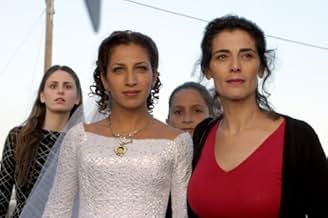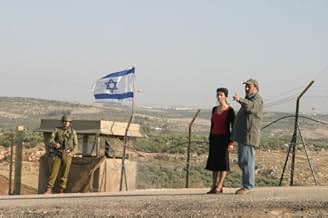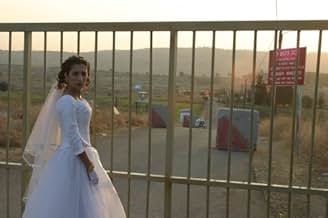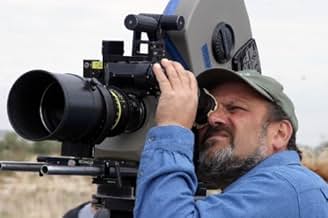The Syrian Bride
- 2004
- 1 घं 37 मि
अपनी भाषा में प्लॉट जोड़ेंIn Majdal Shams, the largest Druze village in Golan Heights on the Israeli-Syrian border, the Druze bride Mona is engaged to get married with Tallel, a television comedian that works in the ... सभी पढ़ेंIn Majdal Shams, the largest Druze village in Golan Heights on the Israeli-Syrian border, the Druze bride Mona is engaged to get married with Tallel, a television comedian that works in the Revolution Studios in Damascus, Syria. They have never met each other because of the occup... सभी पढ़ेंIn Majdal Shams, the largest Druze village in Golan Heights on the Israeli-Syrian border, the Druze bride Mona is engaged to get married with Tallel, a television comedian that works in the Revolution Studios in Damascus, Syria. They have never met each other because of the occupation of the area by Israel since 1967; when Mona moves to Syria, she will lose her undefi... सभी पढ़ें
- पुरस्कार
- 8 जीत और कुल 15 नामांकन
- Amal
- (as Hiyam Abbass)
- Hammed
- (as Makram J. Khoury)
- Marwan
- (as Ashraf Barhoum)
- Evelyna
- (as Evelyne Kaplun)
- Amin
- (as Adnan Trabshi)
- The Mother
- (as Marlene Bajjali)
- Simon
- (as Uri Gabriel)
- Joseph
- (as Robert Hoenig)
फ़ीचर्ड समीक्षाएं
The story takes place on the wedding day of a beautiful bride, a Druze woman in Majd Alshams, a pro-Syrian village located in the conflicted Golan heights (factions pro-Syrian and pro-Israeli live uncomfortably in Druze villages). Our bride is to marry (by arrangement - she has never met him) a Syrian TV soap opera celebrity. The problem arises in that this will be the last time that she sees her family as once she crosses the border into Syria accepting Syrian citizenship, she can never return to the Golan Heights to see her family. The wedding is further complicated by the return visit of her brother who has been away for 8 years having married a Russian by whom he has a son: the brother and the son are in conflict. And to make things worse, the paperwork at the border to allow the bride to join her husband to be in the wedding is held up by political paperwork. How all of these factors impact the bride's future is played out by the families on both sides.
The script tries to make the story seem credible but to those of us who still don't understand the intricacies of the territorial parceling of that area of the world or the traditions of Arab marriage etc, this plot seems ponderous and heavy. The actors are all excellent and there is something in each character with which we can identify. A little background on customs before the film begins would have helped immensely as the movie itself is very well done. Grady Harp
"The Syrian Bride" is an impressive movie, especially considering the nationality of the Israeli director Eran Riklis. I had no idea that in the twenty-first century could exist a place where people has "undefined nationality". The metaphoric situation of the Druze people, represented by the bride and her family, trapped in the non-sense bureaucracy, lack of interest from the governments in resolving the problem and having to face arrogant heartless authorities represented by the despicable chief of the Israeli police is amazing. The acting is top-notch, the plot is original and unique and I really loved this great movie. My vote is eight.
Title (Brazil): "A Noiva Síria" ("The Syrian Bride")
Co-writers Suha Arraf (a Palestinian journalist) and Israeli director Eran Riklis pile almost too much on to this one Druze (Israeli Arab) family living in the occupied Golan Heights in order to make the personal political. The tensions, poignancy and symbolism of a wedding are heightened because when this bride leaves her home for her arranged marriage with a Syrian celebrity, she will not be able to return home.
Every complicated character has a complicated background, whether theirs or their parents' politics or their religiosity or their dress or their educational or romantic aspirations-- and is in a complicated relation to every other character and the authorities.
In addition to the return of prodigal sons from overseas, the larger community intrudes on the intra-family tensions, from robed tribal elders and the police who each bring warnings of proper behavior to a comical videographer. My dependency on English subtitles lessened some of the impact of hearing characters switch from Arabic to Hebrew to French to Russian to English to communicate, as part of the interactions are based on who can understand different languages and who can't. This complex in-gathering all symbolically happens the same day as a demonstration in support of the change over of power in Syria from the father the dictator to the son, while a flat tire leads to a crucial delay. The ubiquitous television, and government attention, however, is focused on the West Bank, making this border a forgotten zone as well as a no (wo)man's land.
What makes it all hang together amidst this human comedy is the central focus from the start to the finish on the almost silent bride, dressed in Western white, and her more verbal older sister, rebelliously in slacks, and both played by powerful actresses. Each has made choices in the past they regret and each chooses their future now, despite the efforts of all their male relatives, let alone global politics, to thwart them and make them helpless.
Even with the heavy-handed baggage of all the "Crash"-like coincidences, the film beautifully makes the point that politics isn't just ideology but affects how people get on with the basics of their lives.
The acting is superb, especially that of Markam Khoury as the father of the bride, Hiyam Abbas as the independent older sister and, of course, Klara Khoury as the Syrian Bride herself. The movie is quadrolingual, and sorta has Hebrew take a back seat. It's mostly in Arabic, and also has some English, Russian and a few words of French. Most viewers will probably be doing quite a lot of reading (subtitles) in this movie, but it's worth it.
The year of 2004 was an amazingly productive one for Israeli cinema, and The Syrian Bride is no exception. You do not want to miss this one.
Mona (Clara Khoury), a young Druze bride is to be wed to Syrian TV-star Tallel (Derar Sliman) from Damascus, a man she has never met. Since neither country recognizes the other diplomatically, once the bride crosses the border to Syria, she will never be allowed to return to Israel and her wedding day, usually a day of great joy, may be one of her saddest. While the film tells us much about the sad realities of the political fragmentation in the Middle East, it is also a story with social and cultural ramifications. Mona's sister Amal (Hiyam Abbas), whose expressive face frames the film's beginning and end, is stuck in an unhappy marriage. She wants to attend Haifa University but is thwarted by her husband Amin (Adnan Trabshi) who is afraid of losing face in the village and of relinquishing "control".
Mona's father Hammed (Makram Khoury), a pro-Syrian agitator known to Israeli police, is forbidden to travel to the Syrian border to say goodbye to his daughter. He harbors resentment and refuses to welcome his son Hattem (Eyad Sheety) and his Russian wife home from Moscow because he broke family tradition and moved away eight years ago. Another son, Marwan (Ashraf Barhom), a businessman, is welcomed by the family but is rejected by an angry former girlfriend, a French Red Cross worker (Julie-Anne Roth), who works in the village. Mona's character is mostly symbolic and she has little to say, yet the story of the film is written on her face and her lack of dimensionality is more than compensated for by the depth of the supporting characters, particularly Hattem and Amal.
As these conflicts bubble under the surface, the situation becomes increasingly absurd as the wedding is threatened by bureaucratic intransigence on the border checkpoints between Israel and Syria. Mona's passport has an Israeli stamp on it and, according to Syrian regulations, anyone carrying a passport with an Israeli stamp is denied entry to Syria. Neither Israeli nor Syrian customs officials seem to know what to do and the prospective bride and groom are stuck in a no-man's land, reduced to communicating via bullhorns pressed against locked gates. The Syrian Bride may sound like an exercise in absurdity bordering on farce, yet for the family who may never see their child again, it is a drama of high seriousness. Whether you consider The Syrian Bride to be an allegory, black comedy, family drama, or political statement, the image of a girl sitting alone in a white wedding dress stuck between impenetrable barriers is one that remains.
क्या आपको पता है
- ट्रिवियाMakram Khoury and Clara Khoury are father and daughter in the film as well as in real life.
- गूफ़Mona's father says he has raised her for 25 years. However, she states her birth date as November 30th 1976 and the movie is set on July 17th 2000. That would make her only 23 years old.
- कनेक्शनFeatured in The Making of The Syrian Bride (2005)
- साउंडट्रैकBride Theme
Music Composed & Conducted by Cyril Morin
Performed by Bulgarian Symphony Orchestra-Sif 309
टॉप पसंद
- How long is Syrian Bride?Alexa द्वारा संचालित
विवरण
- रिलीज़ की तारीख़
- कंट्री ऑफ़ ओरिजिन
- आधिकारिक साइटें
- भाषाएं
- इस रूप में भी जाना जाता है
- Syrian Bride
- फ़िल्माने की जगहें
- उत्पादन कंपनियां
- IMDbPro पर और कंपनी क्रेडिट देखें
बॉक्स ऑफ़िस
- US और कनाडा में सकल
- $3,80,505
- US और कनाडा में पहले सप्ताह में कुल कमाई
- $7,235
- 20 नव॰ 2005
- दुनिया भर में सकल
- $15,22,967
- चलने की अवधि1 घंटा 37 मिनट
- रंग
- ध्वनि मिश्रण
- पक्ष अनुपात
- 2.35 : 1
इस पेज में योगदान दें

































